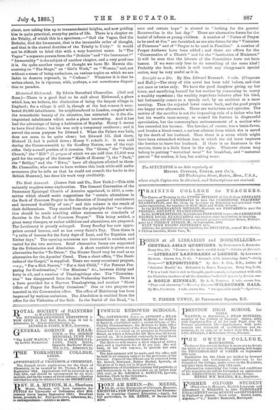The Boots Annexed. (James Pott and Co., New York.)—This title
naturally requires some explanation. The General Convention of the Protestant Episcopal Church of America appointed, in 1830, a com- mittee which should make suggestions for " certain alterations in the Book of Common Prayer in the direction of liturgical enrichment and increased flexibility of use ;" and this volume is the result of their deliberations. They started from the principle that " no altera- tion should be made touching either statements or standards of doctrine in the Book of Common Prayer." This being settled, a great many changes, or rather additions and alterations, are proposed. The Lectionary is greatly enlarged. Every Sunday has now appro. priate second lessons, and so has every Saint's Day. Then there is "a table of lessons for the forty days-of Lent, and for Rogation and Ember days." The opening sentences are increased in number, and varied for the two services. Brief alternative forms are suggested for the Exhortation and Absolution. A short canticle is given as an alternative for the " To Daum." The Nicene Creed may be used as an alternative for the Apostles' Creed. Then a short office, " The Beati- tudes of the Gospel," is supplied. There are many occasional prayers, —e.g., "For a Sick Person," "For a Sick Child," "For Persons Pre- paring for Confirmation," " For Missions," &c., between thirty and forty in all, and a number of Thanksgivings also. The " Commina- tion " has disappeared from the Ash-Wednesday Service. There is a form provided for a Harvest Thanksgiving, and another " Short Office of Prayer for Sundry Occasions." One or two prayers are inserted in the Communion office. The office of Matrimony has been improved by various omissions. The Absolution is omitted from the office for the Visitation of the Sick. In the Burial of the Dead, " in
sure and certain hope " is altered to " looking for the general Resurrection in the last day." There are alternative forms for the burial of infants or young children. A number of "Forms of Prayer to be used at Sea " are furnished, as are also forms for the " Visitation of Prisoners" and of "Prayer to be used in Families." A number of Proper Anthems have been added ; and there are offices for the " Consecration of a Church " and for the " Institution of Ministers." It will be seen that the labours of the Committee have not been barren. If we were only free to do something of the same kind ! Probably the book, which is well worth any clergyman's special notice, may be very useful as it is.


































 Previous page
Previous page